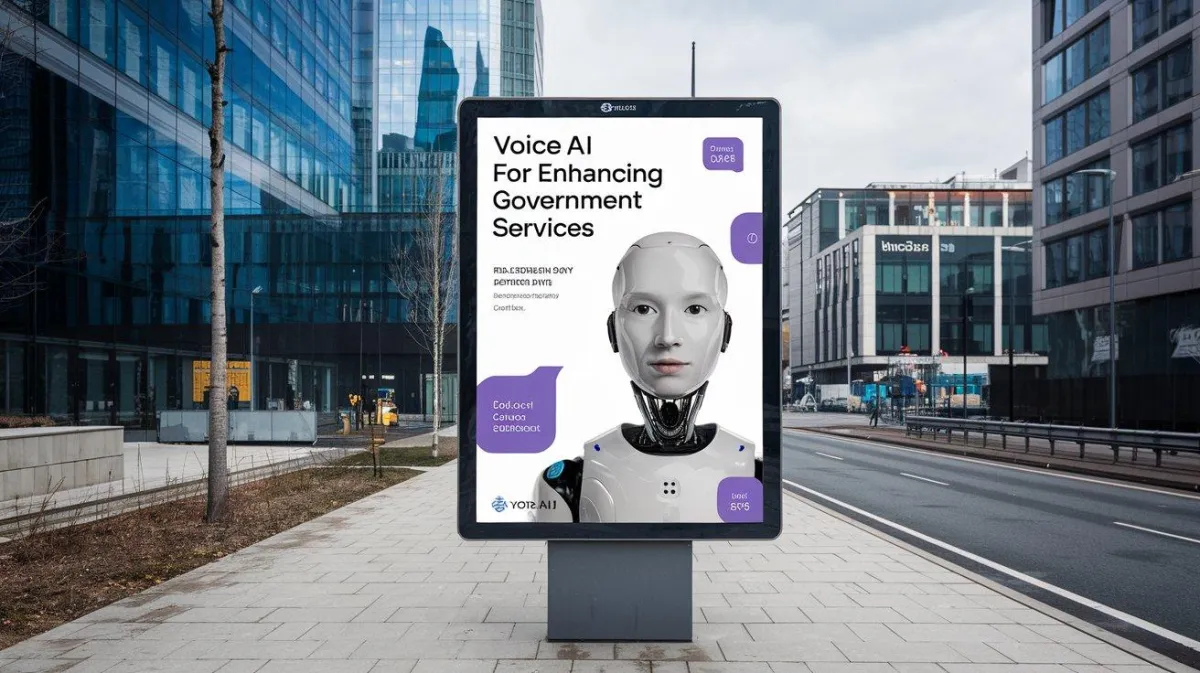
Voice AI for Enhancing Government Services
Voice AI for Enhancing Government Services
Governments face increasing pressure to deliver efficient, accessible, and responsive services to their citizens. From managing inquiries to streamlining service delivery, public service agencies must meet high expectations while operating within tight budgets. Voice AI offers a transformative solution, enabling governments to enhance their service delivery, improve citizen engagement, and reduce operational costs.
This article explores the various ways voice AI can revolutionize public service delivery and create a more seamless experience for citizens.
Streamlining Citizen Inquiries
Public service agencies often deal with a high volume of citizen inquiries, ranging from basic information requests to complex service-related questions. Voice AI agents can handle these inquiries efficiently, providing accurate and instant responses 24/7.
For instance, a citizen might ask, “What are the requirements for renewing my driver’s license?” or “Where can I find the nearest public health center?” Voice AI can provide quick, detailed answers, reducing wait times and ensuring citizens receive the information they need promptly.
Simplifying Service Applications and Registrations
Voice AI can assist citizens in completing applications for services or registrations, guiding them step-by-step through the process. Whether it’s applying for social benefits, registering for public programs, or renewing official documents, AI agents make these processes easier and more accessible.
For example, a voice AI agent might guide a citizen through completing a form by asking, “Please provide your full name” or “What is your address?” This interactive approach ensures accuracy and minimizes errors, saving time for both citizens and government staff.

Providing Multilingual Support for Inclusive Services
Many government agencies serve diverse populations with varied linguistic needs. Voice AI can offer multilingual support, enabling citizens to interact in their preferred language.
For instance, a voice AI agent might assist a citizen in Spanish, Mandarin, or any other language supported by the agency. This inclusivity ensures that language barriers do not prevent citizens from accessing essential services, fostering greater trust and engagement.
Managing Emergency and Crisis Support
During emergencies or crises, citizens often turn to government agencies for assistance. Voice AI agents can provide real-time updates, guidance, and support, helping citizens navigate challenging situations effectively.
For example, during a natural disaster, voice AI could inform citizens about evacuation routes, emergency shelters, or safety measures. This capability ensures timely and accurate communication when it’s needed most, reducing panic and improving public safety.
Streamlining Appointment Scheduling
Many government services require scheduled appointments, such as passport renewals, tax consultations, or medical assessments. Voice AI can automate appointment scheduling, enabling citizens to book, reschedule, or cancel appointments without long wait times.
For instance, a citizen might ask, “Can I book an appointment for next week?” and the AI agent can offer available slots, confirm the booking, and send reminders. This automation simplifies the process for citizens while reducing the workload for government staff.
Collecting Citizen Feedback for Continuous Improvement
Voice AI can gather feedback from citizens after they interact with public services, providing valuable insights into service quality and areas for improvement.
For instance, after a service interaction, the AI might ask, “How satisfied were you with the assistance you received?” or “Do you have any suggestions for improving this process?” Analyzing this feedback allows government agencies to refine their services and better meet citizen needs.
Enhancing Accessibility for Citizens with Disabilities
Voice AI can play a critical role in creating accessible services for individuals with disabilities. By offering voice-based interactions, these agents provide a user-friendly alternative for citizens who may face challenges using traditional interfaces like websites or mobile apps.
For example, a visually impaired citizen can use voice AI to navigate services, make inquiries, or complete applications without relying on visual cues. This inclusivity ensures that all citizens can access public services equally.
Reducing Operational Costs
One of the key advantages of voice AI is its ability to reduce operational costs while maintaining high service quality. By automating repetitive tasks and inquiries, government agencies can allocate human resources to more complex or critical issues, improving overall efficiency.
For example, instead of dedicating staff to answering basic questions, agencies can rely on voice AI to handle routine inquiries, freeing up personnel for specialized tasks. This cost-effective approach allows governments to do more with limited budgets.
Ensuring Data Security and Privacy
When implementing voice AI in public services, it’s essential to prioritize data security and privacy. Advanced voice AI solutions can comply with data protection regulations, ensuring that citizen information remains secure and confidential.
By integrating robust encryption and secure storage protocols, government agencies can build trust with citizens while leveraging the benefits of voice AI.
Getting Started with Voice AI in Public Services
To integrate voice AI effectively, government agencies should:
Identify key areas where AI can add value, such as inquiries, registrations, or feedback collection.
Train AI models with accurate, up-to-date information about services and policies.
Integrate AI systems with existing platforms like websites, mobile apps, or databases.
Monitor performance and gather feedback to continuously improve the AI’s capabilities.
These steps ensure a seamless implementation that enhances both efficiency and citizen satisfaction.
Conclusion
Voice AI has the potential to revolutionize public services by automating routine tasks, improving accessibility, and providing timely support to citizens. From handling inquiries and applications to managing crises and collecting feedback, voice AI empowers governments to deliver more efficient and responsive services.
For public service agencies looking to modernize their operations and better serve their communities, integrating voice AI is a forward-thinking solution that aligns with the needs of today’s citizens.
STAY UPDATED
Sign up to be the first to find out when we add new languages, new bots, new capablities, and more. We respect your privacy and will never share your information with any third-party vendors.
Sign up to be the first to find
out when we add new
languages, new bots, new
capablities, and more. We
respect your privacy and will
never share your information
with any third-party vendors.




